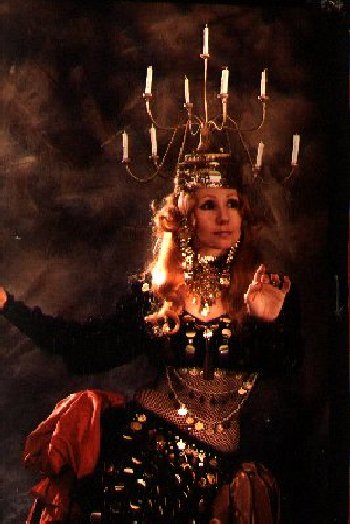
 Jacqueline Chapman in traditional costume and shamadan Jacqueline Chapman in traditional costume and shamadan
|
Raqs Orientale, (literally "oriental dance",
in Arabic) has always been danced in the Middle East. It is a wonderful
pot-pourri of myth and magic and has been handed down in families as a social
grace from mother to daughter, elder to younger sister. |
It is a graceful, skilful, high art-form, admired and
respected by those who understand it. The whole gamut of emotions is
called upon whilst performing: sad, happy, sensual, powerful, giving, caring.
The joy for Jacqueline is that she can teach a dancer to perform an
authentic move such as a Camel Walk or Hip Drop, but will encourage the dancer
to retain her individuality, so that her own personality shines through.
Each dancer develops her own style whilst enjoying the journey, learning
the magic of Middle Eastern dance.
It is a significant form of self-expression at all
ages and stages of womanhood; slow or fast, soft and sensual, controlled
and commanding, passionate and powerful, assertive and addictive.
It is also an exciting way of keeping fit, reducing
tension and inducing a feeling of physical and spiritual well-being.
"Love can evoke emotions, as can nourishing your
soul with song or dance."
The name for Middle Eastern dance changes
from country to country:
RAQS ORIENTALE Oriental Dance.
Covers all styles including Egyptian, Turkish, Lebanese, Armenian, Greek
and Algerian.
RAQS (or RAKS) SHARQI (or SHARKI)
(Egyptian). Oriental Dance, with three main forms: Folk, Classical
and Baladi.
BELLY DANCE This name dates from the 1893 Chicago World Fair's "Algerian Village" display. Finding that
the lure of "Danse du Ventre" was minimal, the promoter coined the term "Belly
Dance" and, in those Victorian times, was swamped with audiences. Jacqueline's
personal view is that corrupting the name paved the path to corrupting this
ancient art-form. Purists prefer the traditional titles, but the whole world
now uses the all-embracing "Belly Dance".
Raqs Orientale will set free the inner mind and body
with wonderfully stimulating movements allowing self expression of the soul
and flexibility of body.
Jacqueline's approach is to teach Raqs Orientale
technically, providing the dancer with training but also giving confidence
to dance with the heart and not just with the feet.
"To see Jacqueline dance or teach is to
know that she is in love with her art-form" |